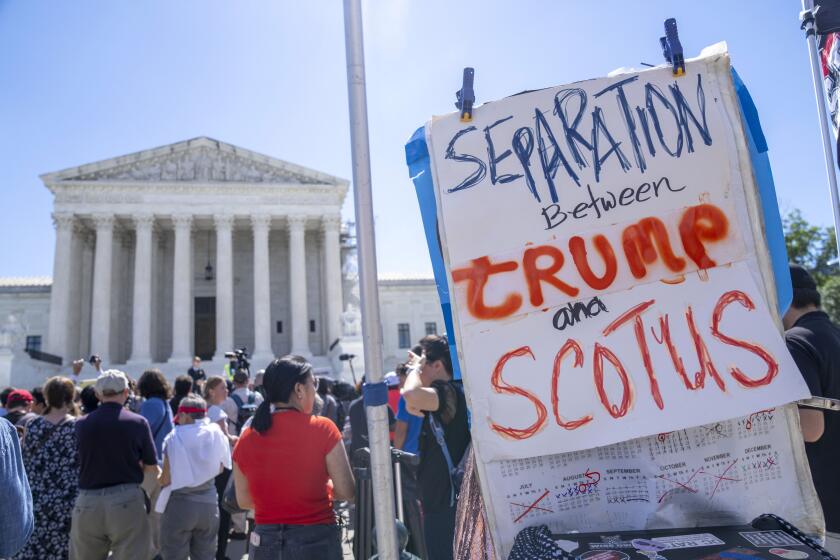Opinion: Judge Aileen Cannon is flat-out wrong, again

- Share via
Judge Aileen Cannon’s stunning ruling dismissing the federal indictment against Donald Trump for mishandling classified documents is just wrong as a matter of constitutional law, but it can be easily overcome.
Cannon held that it is unconstitutional to have a special counsel appointed by the attorney general to handle a prosecution unless there is a specific law authorizing it. The simple solution is for Atty. Gen. Merrick Garland to treat the classified documents case as a crime like any other, one that doesn’t require a special counsel. He can direct a United States attorney to immediately refile the case in federal court, and under Cannon’s reasoning there would be no constitutional problems.
The judge presiding over the case has dismissed the prosecution because of concerns over the appointment of Jack Smith, the prosecutor who brought the case.
From the outset, Cannon, who was appointed to the federal district court bench by Trump, has handled the case in a way that seemed designed to protect him. For example, earlier she ruled that a higher standard had to be met to justify a search warrant for a former president. The federal court of appeals reversed this and said that the same standards apply under the 4th Amendment to everyone.
In addition to saying that that the attorney general cannot appoint a special counsel and protect the counsel from removal, Judge Cannon also said that it is impermissible for the Department of Justice to fund a special counsel on an ongoing basis.
Judge Cannon’s decision on Monday is flat-out wrong because it is inconsistent with U.S. Supreme Court precedents and the rulings of many other courts.
The Supreme Court’s conservatives are likely to agree with the judge’s ruling in dismissing Trump’s special prosecutor
The crucial problem is that under Article II of the Constitution, the attorney general, like all Cabinet officials, can appoint “inferior officers” and can provide funding for them. Statutes give each Cabinet head broad authority to make these appointments.
The Supreme Court said all this explicitly in United States vs. Nixon in 1974. A unanimous Supreme Court declared, “Congress has also vested in [the attorney general] the power to appoint subordinate officers to assist him in the discharge of his duties.” The court explicitly held that the attorney general could appoint a special prosecutor to investigate offenses arising out of the 1972 presidential election and allegations involving President Nixon.
Cannon said that this was just “dicta” from the Supreme Court, language unnecessary to its holding, and that she was not bound by it. Quite the contrary, if the Supreme Court had come to Cannon’s conclusion, it would have had to dismiss the case before it.
The homelessness and ‘Chevron deference’ Supreme Court decisions change law for the worse. They never would have happened if Hillary Clinton had won in 2016.
The United States Court of Appeals for the District of Columbia repeatedly has addressed this issue and come to exactly the opposite conclusion as Cannon.
In 1987, there was a constitutional challenge to the special counsel investigating the Iran-Contra scandal during the Reagan administration. The federal court of appeals said: “We have no difficulty concluding that the Attorney General possessed the statutory authority to create the Office of Independent Counsel: Iran/Contra and to convey to it the ‘investigative and prosecutorial functions and powers’ described in ... the regulation. ... While [the specific statutes] do not explicitly authorize the Attorney General to create an Office of Independent Counsel virtually free of ongoing supervision, we read them as accommodating the delegation at issue here.”
In 2019, much the same challenge was brought to special counsel Robert S. Mueller III’s investigation of Russian interference in the 2016 presidential election. Once more, the federal court of appeals said the attorney general had the authority to make and fund the appointment. And just last year, a federal court rejected the same constitutional challenge to the special counsel who was prosecuting Hunter Biden. Cannon’s ruling just says she thinks these courts were wrong.
The conservative justices granted presidents broad protection for official acts. That appears to include much of the conduct in the federal Jan. 6 indictment.
Cannon also contends that the Justice Department cannot fund a special counsel on an ongoing basis. Every department has discretion over a good deal of its budget. In fact, just this past term, the Supreme Court upheld the constitutionality of the Consumer Protection Financial Bureau and stressed the flexibility the Constitution provides in providing funding to federal activities.
What makes Cannon’s ruling dangerous is that it would eliminate a crucial tool to allow Justice Department prosecutions that have independence, and the appearance of independence, from political control, given that the attorney general is a presidential appointee.
The justices facilitated government and corporate corruption by weakening laws and regulations affecting the environment, finance, public officials and more.
After Watergate, Congress passed the Ethics in Government Act to create special prosecutors who could be removed only for cause and who were completely independent of the attorney general. The Supreme Court, in 1988, upheld the constitutionality of this statute. But after several lengthy investigations, including the Whitewater investigation of President Clinton, the act was allowed to lapse and was not renewed.
A new mechanism was created to allow independent investigations but with more accountability. The attorney general appoints special counsels and by internal Justice Department regulations assures them of independence. This provides public confidence in the investigation that would be lacking without that independence, which is particularly desirable when the person being investigated is a president or former president or one of their family members or a high-level government official. Because of the Article II powers, this mechanism, as much as the earlier law, is constitutional.
Special counsel Jack Smith could appeal Judge Cannon’s ruling to the United States Court of Appeals for the 11th Circuit. But that process will take months and it would ultimately likely go to the Supreme Court. The expeditious solution for this case is for Atty. Gen. Garland to have the Justice Department, through a U. S. attorney, refile the indictment against Trump. This would bypass Cannon’s problems with the special counsel.
Erwin Chemerinsky is a contributing writer to Opinion and dean of the UC Berkeley School of Law.
More to Read
A cure for the common opinion
Get thought-provoking perspectives with our weekly newsletter.
You may occasionally receive promotional content from the Los Angeles Times.














